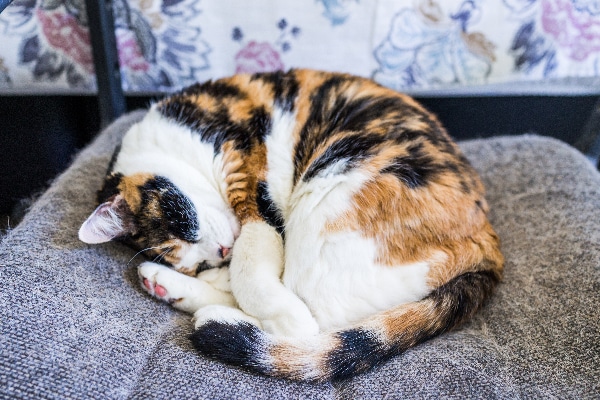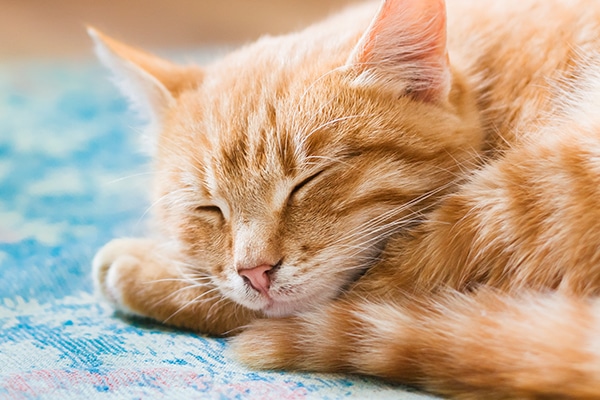Is Cat Snoring Normal?
The post Is Cat Snoring Normal? by Dr. Eric Barchas appeared first on Catster. Copying over entire articles infringes on copyright laws. You may not be aware of it, but all of these articles were assigned, contracted and paid for, so they aren't considered public domain. However, we appreciate that you like the article and would love it if you continued sharing just the first paragraph of an article, then linking out to the rest of the piece on Catster.com.
Do cats snore? And if cats do snore, is cat snoring something to worry about? The short answer is that some cats snore. For many, nothing is wrong. However, some cat snoring can be a sign of trouble.
Why does cat snoring happen?

Do cats snore? And if cats do snore, when is cat snoring an issue? Photography ©krblokhin | iStock / Getty Images Plus.
Snoring occurs when the passages in the “upper airways” — the nose, back of the mouth (the so-called pharynx), or throat — vibrate audibly during breathing. Vibrations and the resulting snoring are most likely to occur when the tissues of the upper airways are relaxed during sleep.
Persians and other short-nosed, flat-faced or brachycephalic breeds are the usual culprits of cat snoring in the feline world. As humans have bred them to have shorter noses, the tissues in the upper airways have become unnaturally tortuous. When air moves through the convoluted tissues, vibration and snoring are common. In extreme cases, audible breathing noises might even occur while awake. Although snoring while awake is essentially standard in Bulldogs, it’s not as common in cats — and that’s a good thing, because snoring while awake sometimes can be linked to breathing difficulties.
When is cat snoring a sign of a health issue?
In some instances, cat snoring can be a sign of a health problem. The most basic and common health issue that leads to cat snoring is being overweight or obese. Excess body weight leads to fat accumulation in the tissues surrounding the upper airways, which in turn can trigger snoring. This phenomenon is quite common in people as well as cats and dogs.
Cats with upper respiratory infections might develop snoring. The audible breathing occurs due to sinus congestion or mucus buildup in the airways. Viral and bacterial infections are most common, and these usually are self-limiting or curable with medication. However, fungal infections also are possible, and these have the potential to be more serious.
Foreign objects (such as grass blades) in the back of the mouth or nose might trigger cat snoring as well as coughing, agitation and sinus infections.
More perniciously, masses or tumors in the sinuses or upper airways might cause snoring. Cancers such as lymphoma, fibrosarcoma and adenocarcinoma can be culprits of cat snoring. Benign polyps also occur.
How can you determine whether cat snoring is a problem or not?

When does cat snoring warrant a visit to the vet? Photography ©Ryhor Bruyeu | iStock / Getty Images Plus.
There are some simple guidelines for determining whether cat snoring has a medical problem. Light snoring that occurs during sleep, is not linked to respiratory distress, and that is stable in nature (meaning it doesn’t become more pronounced over time) probably isn’t a problem. Cat snoring that becomes progressively louder or is linked to other symptoms such as sneezing, coughing or changes in appetite is probably as sign of illness. Snoring that occurs in combination with respiratory distress is a medical emergency — respiratory distress is always a medical emergency.
When in doubt, the best option is to have your cat checked by a vet. A course of antibiotics might help speed recovery from a upper respiratory infection. Anesthetic evaluation of the back of the throat might reveal a grass blade that can be removed.
In some cases, snoring that even seems to define a cat’s character can and should be eliminated. Many years ago I had a patient named Wheezer. She was a sweet cat who earned her name through her snoring. When she was anesthetized for dental work, I evaluated the back of her throat and found a large benign polyp. After the polyp was removed, the cat snoring stopped. Despite this development, the owners opted not to change her name.
Plus, wondering why YOU snore? Check out some insight here >>
Thumbnail: Photography by Jolanta Beinarovica / Shutterstock.
This piece was originally published in 2017.
Read more on cats and sleep on Catster.com:
- Is Your Cat Sleeping Too Much — or Not Enough?
- 5 Facts About Cats and Sleep
- Why Do Cats Sleep So Much? 5 Facts About Sleeping Cats
The post Is Cat Snoring Normal? by Dr. Eric Barchas appeared first on Catster. Copying over entire articles infringes on copyright laws. You may not be aware of it, but all of these articles were assigned, contracted and paid for, so they aren't considered public domain. However, we appreciate that you like the article and would love it if you continued sharing just the first paragraph of an article, then linking out to the rest of the piece on Catster.com.




Post a Comment